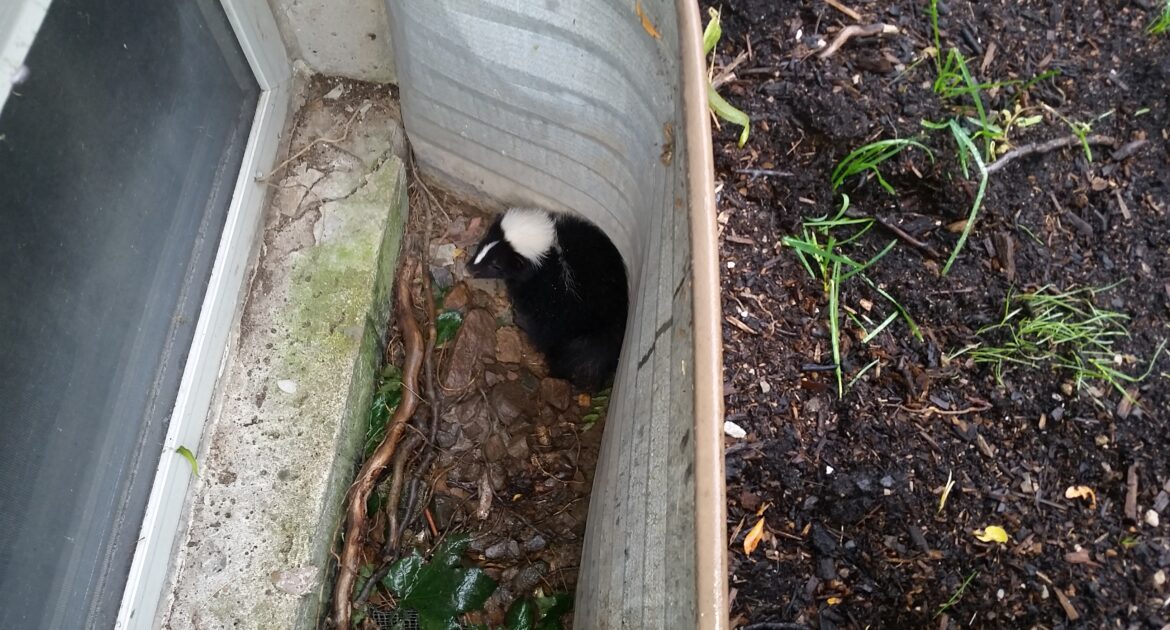Skunks are known to make people turn up their noses and run in the opposite direction. Never do people yank a leash faster than when a skunk is in the path of their evening dog walk. These animals are recognizable from a mile away by their stark black and white colouring and extra fluffed tails. But is there more to skunks than just their stink? Learn about skunks and who to contact for Coquitlam wildlife control if you need humane skunk removal.
Types
Skunks are best recognized as their cartoon counterpart, Pepé Le Pew. The primarily black body with bright white stripes makes the skunk an easily distinguishable animal in the wild. However, skunks can also be spotted, swirled, or mottled. Be aware that whether a skunk is striped or spotted, it still retains its most powerful feature, the stink.
Defenses
Skunks aren’t out to spray their stink without cause on anything in their path. In fact, skunks will often go through several warning signals prior. Their stink is limited and can take up to 10 days to replenish itself if depleted. Like many other animals, skunks will hiss several times to let an aggressor know that it is invading the skunk’s space. If that doesn’t work, the skunk will then charge back and both at the aggressor to let them know they need to make some space.
To continue to deter contact, skunks will give a good show. The skunk will continue to hiss and stomp its front legs until it feels like there is no other option but to defend itself with the stink. The skunk will then raise its tail and can spray a target up to 10 feet away. Skunks can do this because they have a gland under their tail that produces sulfuric compounds called thiols. Thiols are also oily, which is what causes the smell to stay for so long.

Scents
Everyone knows that skunks have a signature repellant scent, but are there any smells that skunks find as offensive as we find skunks? Of course! Skunks have sensitive noses to alert them of danger. Their only natural predator is the great horned owl, but that doesn’t stop them from turning their noses up at a selection of everyday scents that humans don’t even notice.
Skunks hate the smell of ammonia; whether it’s from the potential threat of a cat in feline urine or chemical poisoning, skunks aren’t here for it. Vinegar is another no-no for skunks because it irritates their sensitive noses Citrus smells have high acidity, and while humans like these scents for cleaning and household fresheners, skunks do not share the same sentiments. Chilli or cayenne pepper will agitate the skunk’s sinuses with the capsaicin component. Capsaicin is what makes peppers spicy. Coffee grounds are another standard household product that skunks detest. Coffee grounds are not only acidic, but they begin to compost almost immediately, giving off unpleasant gases.
Foods
Skunks – they’re not for dinner. But skunks are omnivores in their own dinner choices, which means they will eat both meat and vegetables or vegetation. Skunks generally survive on plants, bugs, smaller mammals, and fish. Skunks are also renowned for snatching eggs from nests as a treat for themselves. They do not seek out humans or household pets as prey, so you can relax there. But, the occasional outdoor dog food or cat food bowl might go empty if a skunk has anything to do with it.
It is best to call in a professional if you find out that you share a space with a skunk. While skunks are not out to harm humans, they can still be dangerous if threatened, and no one wants to risk getting sprayed. Call Skedaddle Humane Wildlife Control in Coquitlam for humane skunk removal.




